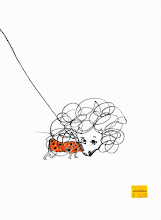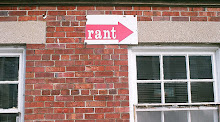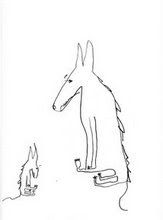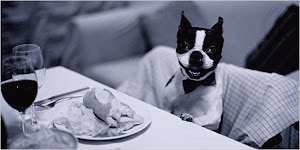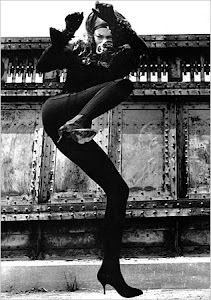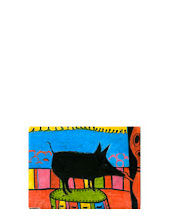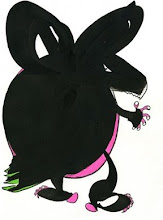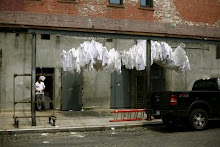My friend Blatch, as the author is known, has written an adventure book. Fifteen Days refers to key dates in the Canadian battle to save Afghanistan, mostly from itself. The book is meant to illuminate the new Canadian military for those of us who thought Canada didn't have one.
In many ways there could be no better assignment for Christie Blatchford. She is one of those rare women who truly loves men, especially those who do brave things with uniforms on -- cops, hockey players, soldiers for example. She loves those who do their duty. Who feel they have one in the first place. There is an early scene in this book where (and I am going to get ALL the terminology wrong) a platoon was doing a route reconnaissance and spotted Taliban. Official procedure is to note this information in the official way, exactly the same each time, which is to announce "contact, reference X, 600 metres left" or somesuch. Instead what the eyes of the platoon barked to the others was "Jim, they're on the right! Fuck 'em up!" That boy, whoever he was, just won himself a spot in Blatch's heart forever. She loves that kind of get-it-done.
Now that I think about it, who WOULDN'T love that man? That was bloody sexy, what he did.
As I say, Blatch loves manly men, not for what they can do for her status or bank account or how they can worship her wonderfulness but rather in a pure and admiring way -- she simply loves that mysterious club they all belong to where they innately know how to do things like "fuck 'em up" and are willing to go there and do it, whatever It is. Those of us who live in big cities with all their urban glossy-haired fat-free-yogurt-eating metrosexuals, could easily have thought this breed of man extinct.
The men described in this book are heroic. Solid, true, decent, and that rare thing, brave.
I am not far into this book, which reads like a Boys' Own adventure novel, fast-paced and exciting, not unlike great hockey coverage actually, and what is starting to really hurt is knowing as I read about this man or another, he is going to die. I'm going to lose him. I know he (or she) is one of those killed in battle and I can hardly bear it. Imagine the high price Canadian families to whom this man is son, lover, dad, pay for this effort, and they pay it willingly.
I would tell you more but I have to get back to my book.
Saturday, December 29, 2007
Thursday, December 27, 2007
The Uncommonn Reader
What a charmer, what a delight, what a fantastically wonderful and clever little story this is! The Uncommon Reader is of course the Queen and she becomes ADDICTED to the written word to the chagrin of all around her. But that is just the barest outline, what is so compelling is the wit with which this fable is written.
Imagine if you will the equerries fixing the crowd so we can be through by lunch, pre-populating the crowd with the answers to the usual dopey questions so they don't have a fit of "omigod it's the QUEEN", teaching small talk on the fly. But then the Queen stops asking where they're from and how long was the drive and asks -- egads -- what they are READING!! Stunned, flummoxed, caught for words they croak uh ma'am, I'm from Brighton.
Well, something like that.
There is a lovely scene where the Queen decides to honour these authors she has come to admire so much and learns the lesson we all do. But for a meagre handful, when it comes to authors it is all in the book. A more dull or self-ref-and-reverential crowd you are unlikely to meet. Back when I was in book retail we used to want to seduce our customers by holding "Author Events" which were readings at their worst (seriously, unless you are in your jammies and about to go to bed do you want someone to read aloud? their own stuff?) or brief (sweet brevity) chats about the inspiration behind the book. The one exception was Martin Amis and if you ever have the chance to hear him speak about anything, go. Another exception was the youngest daughter of Charles Lindbergh whose name escapes me, who wrote some kind of memoir. Could have been interesting, given that the most famous Lindbergh child and the only one anyone can readily bring to mind is a dead baby. She told the story of taking her own son to see a Lindbergh museum, where the Spirit of St. Louis was housed. The museum keepers had a cherry picker there so that she and her son could rise from the ground and see the famous airplane up close. She reached her hand and touched the cockpit and said to her boy, "Isn't this amazing?" and he said "Yeah!!! For sure!!! I've never been in a cherry picker before!!!!" The book bombed but the event was nice.
The Queen's author event was not this successful.
The Uncomon Reader is, sadly, a short book but please, please, read it. It will make your day.
Imagine if you will the equerries fixing the crowd so we can be through by lunch, pre-populating the crowd with the answers to the usual dopey questions so they don't have a fit of "omigod it's the QUEEN", teaching small talk on the fly. But then the Queen stops asking where they're from and how long was the drive and asks -- egads -- what they are READING!! Stunned, flummoxed, caught for words they croak uh ma'am, I'm from Brighton.
Well, something like that.
There is a lovely scene where the Queen decides to honour these authors she has come to admire so much and learns the lesson we all do. But for a meagre handful, when it comes to authors it is all in the book. A more dull or self-ref-and-reverential crowd you are unlikely to meet. Back when I was in book retail we used to want to seduce our customers by holding "Author Events" which were readings at their worst (seriously, unless you are in your jammies and about to go to bed do you want someone to read aloud? their own stuff?) or brief (sweet brevity) chats about the inspiration behind the book. The one exception was Martin Amis and if you ever have the chance to hear him speak about anything, go. Another exception was the youngest daughter of Charles Lindbergh whose name escapes me, who wrote some kind of memoir. Could have been interesting, given that the most famous Lindbergh child and the only one anyone can readily bring to mind is a dead baby. She told the story of taking her own son to see a Lindbergh museum, where the Spirit of St. Louis was housed. The museum keepers had a cherry picker there so that she and her son could rise from the ground and see the famous airplane up close. She reached her hand and touched the cockpit and said to her boy, "Isn't this amazing?" and he said "Yeah!!! For sure!!! I've never been in a cherry picker before!!!!" The book bombed but the event was nice.
The Queen's author event was not this successful.
The Uncomon Reader is, sadly, a short book but please, please, read it. It will make your day.
Wednesday, December 26, 2007
Wild Mary: A Life of Mary Wesley
Mary Wesley is a British author whose career took off like a shot at the age of seventy-something. This is brilliant news for those of us suffering yet another mid-life crisis.
As happens with many a biography, the introduction is the best part. From this excellent precis we move on to a rather tedious array of dates and dates -- who Mary was seeing or slept with during what month and year -- sort of putting the pin in the idea of "wild".
But back to the intro for a moment. Here we see Mary, the widow of a failed writer, who has written a kids' book which was published without much financial success, who cannot make ends meet, whose kids are strange or estranged, who suffers illness on top of poverty, who has one of those literary agents who, finally, after trying for years to flog the mss for Jumping the Queue and Haphazard House, sends an "encouraging" note to her client: "I don't feel we would have much chance of anyone willing to take either of these books. However I shall be very happy to keep the Mss and mention them to publishers as I see them, just in case someone is adventurous enough to give it a try." Damn me with faint praise! Luckily Mary took much the same view and then matters into her own hands.
What this wonderful intro shows is that Mary was too down and out to even be counted as down and out. That's how out. Her diary during one weekend reads, for each day, "ILL. Very ILL. Very ILL, raving. very ill." And then something wonderful happened.
Mary sold her damp cottage and moved and then, only then, life took off. Finally a publisher took her odd and adventurous Jumping the Queue, about a casually cruel and used up, cheated upon wife's decision to simply off her self (charming? indeed. Blew the dust off that British middle class "we're so lovely" thing) and voila, Mary churned out a book a year to raves for the next decade.
What Mary shows is that however dreary and despairing you may feel, so long as you are alive you still have a chance. And, slightly less maudlin, eventually perhaps talent will out. Mary's voice as a writer is fresh, acerbic, true and what she proves is that life didn't start with YOU -- your grandmother's generation was at least as sinful, smarmy, adventurous, crazy, sick, perverse, fun, funny and vile as yours. She just didn't say so at dinner parties and then publish the memoirs. Mary had the courage to say so.
I found these pages terrifically inspiring. Had I been sick and raving in a damp and remote cottage with nary a soul around to give a shite, had I been married to a hugely ineffectual dreamer, had I bothered to have kids who then could not be bothered, had I been impoverished and repeatedly spurned for the one thing I thought I could do (write), well, I may have jumped the queue. I tend to think if WILD SUCCESS has not found me yet, it never will. Ha. Mary was still reeling at my age, and WILD SUCCESS was still years away. But it was there, as was a hugely energetic and prolific and exciting LIFE. Amazing! She could NOT have felt any better than I do and look what happened!!
Now, if the rest of the book were as light and cheering as this we'd have a best seller for the ages. Sadly, the book tames Wild Mary. But, I'll press on and let you know if there are any other great lessons to be found. Suffice it to know that life starts when it starts, and isn't confined to age.
As happens with many a biography, the introduction is the best part. From this excellent precis we move on to a rather tedious array of dates and dates -- who Mary was seeing or slept with during what month and year -- sort of putting the pin in the idea of "wild".
But back to the intro for a moment. Here we see Mary, the widow of a failed writer, who has written a kids' book which was published without much financial success, who cannot make ends meet, whose kids are strange or estranged, who suffers illness on top of poverty, who has one of those literary agents who, finally, after trying for years to flog the mss for Jumping the Queue and Haphazard House, sends an "encouraging" note to her client: "I don't feel we would have much chance of anyone willing to take either of these books. However I shall be very happy to keep the Mss and mention them to publishers as I see them, just in case someone is adventurous enough to give it a try." Damn me with faint praise! Luckily Mary took much the same view and then matters into her own hands.
What this wonderful intro shows is that Mary was too down and out to even be counted as down and out. That's how out. Her diary during one weekend reads, for each day, "ILL. Very ILL. Very ILL, raving. very ill." And then something wonderful happened.
Mary sold her damp cottage and moved and then, only then, life took off. Finally a publisher took her odd and adventurous Jumping the Queue, about a casually cruel and used up, cheated upon wife's decision to simply off her self (charming? indeed. Blew the dust off that British middle class "we're so lovely" thing) and voila, Mary churned out a book a year to raves for the next decade.
What Mary shows is that however dreary and despairing you may feel, so long as you are alive you still have a chance. And, slightly less maudlin, eventually perhaps talent will out. Mary's voice as a writer is fresh, acerbic, true and what she proves is that life didn't start with YOU -- your grandmother's generation was at least as sinful, smarmy, adventurous, crazy, sick, perverse, fun, funny and vile as yours. She just didn't say so at dinner parties and then publish the memoirs. Mary had the courage to say so.
I found these pages terrifically inspiring. Had I been sick and raving in a damp and remote cottage with nary a soul around to give a shite, had I been married to a hugely ineffectual dreamer, had I bothered to have kids who then could not be bothered, had I been impoverished and repeatedly spurned for the one thing I thought I could do (write), well, I may have jumped the queue. I tend to think if WILD SUCCESS has not found me yet, it never will. Ha. Mary was still reeling at my age, and WILD SUCCESS was still years away. But it was there, as was a hugely energetic and prolific and exciting LIFE. Amazing! She could NOT have felt any better than I do and look what happened!!
Now, if the rest of the book were as light and cheering as this we'd have a best seller for the ages. Sadly, the book tames Wild Mary. But, I'll press on and let you know if there are any other great lessons to be found. Suffice it to know that life starts when it starts, and isn't confined to age.
Tuesday, December 25, 2007
The Girls, again
As it turns out, The Girls is not exactly as I thought it was.
The girls are conjoined twins and they are about to die because, well, conjoined twins do not live all that long and because one of them has an aneurysm that is about to end her life which means the other will die, too, by bleeding to death.
Being conjoined means of course that there is literally a shadow, a friend for life, the "other" who we are truly attached to -- but what this wonderful book shows is that as close as two people can be, it is impossible still to know one another.
The twins remember things differently though clearly they both witnessed the exact same thing; they protect each other from truths deemed to painful; they are often annoyed with one another. But most surprisingly, though they share every single thing, they don't know each other terribly well.
So, on a fundamental level, we are each utterly alone. No matter how attached we believe ourselves to be.
The girls are conjoined twins and they are about to die because, well, conjoined twins do not live all that long and because one of them has an aneurysm that is about to end her life which means the other will die, too, by bleeding to death.
Being conjoined means of course that there is literally a shadow, a friend for life, the "other" who we are truly attached to -- but what this wonderful book shows is that as close as two people can be, it is impossible still to know one another.
The twins remember things differently though clearly they both witnessed the exact same thing; they protect each other from truths deemed to painful; they are often annoyed with one another. But most surprisingly, though they share every single thing, they don't know each other terribly well.
So, on a fundamental level, we are each utterly alone. No matter how attached we believe ourselves to be.
Monday, December 17, 2007
The Girls
Perhaps all of life is the search for The Other, that soul which completes your own. Isn't this the promise of all love affairs, isn't this the hunger that makes spinsters and bachelors crazy?
In other hands The Girls by Lori Lansens would be peculiar or downright macabre. One thinks of Barbara Gowdy and her fascination with freaks and their strange ways, forced upon them by mismatched anatomy. A story detailing all their ins and outs probably tells us something about the human condition but not anything that you can take with you to a dinner party. The Girls, on the other hand, uses a peculiarity to tell the truth about something common to us all.
Ruby and Rose are conjoined twins, attached to one another literally at the head and therefore deeply attached through the heart. Ironically, because of their fixation, they cannot see one another and rely on mirrors when they need to look each other in the eye. Imagine being so close to someone and not to be able to actually SEE them -- isn't this something interesting to contemplate? How much of knowing is seeing, and how often does someone we know very well become invisible. What the soul knows the eyes don't need to see.
Well, it's a thought anyway.
Being so strange means in some ways that they have each other but no one else; they literally cannot live apart. All of life is a negotiation and every second is obviously spent with a witness -- you can see that there is a down side to having so close a soul mate.
The "other" is also the thread woven throughout The Thirteenth Tale, where Margaret was a conjoined twin whose "other" was sacrificed so she could live. She seeks her other constantly, and sees her in the reflection of her own face in mirrors and blackened windows.
Both books are fantastically good. Both describe a closeness and yet a yearning for something intangible which is missing, a lack that must be essentially human.
Like Margaret, I have always wanted a sister at the very least, a twin at the best. I have missed my unborn sister terribly. I don't imagine her so much anymore but when I was a child I felt her absence acutely, my ballast against the cruelties of the world.
The thing is, and it is just a passing notion, even if my sister and I were joined at the head if not the hip, there are things she would not know or like. Even conjoined we are essentially alone.
How sad is that?
Perhaps it isn't. Perhaps we can live in our own private paradise no matter what.
In other hands The Girls by Lori Lansens would be peculiar or downright macabre. One thinks of Barbara Gowdy and her fascination with freaks and their strange ways, forced upon them by mismatched anatomy. A story detailing all their ins and outs probably tells us something about the human condition but not anything that you can take with you to a dinner party. The Girls, on the other hand, uses a peculiarity to tell the truth about something common to us all.
Ruby and Rose are conjoined twins, attached to one another literally at the head and therefore deeply attached through the heart. Ironically, because of their fixation, they cannot see one another and rely on mirrors when they need to look each other in the eye. Imagine being so close to someone and not to be able to actually SEE them -- isn't this something interesting to contemplate? How much of knowing is seeing, and how often does someone we know very well become invisible. What the soul knows the eyes don't need to see.
Well, it's a thought anyway.
Being so strange means in some ways that they have each other but no one else; they literally cannot live apart. All of life is a negotiation and every second is obviously spent with a witness -- you can see that there is a down side to having so close a soul mate.
The "other" is also the thread woven throughout The Thirteenth Tale, where Margaret was a conjoined twin whose "other" was sacrificed so she could live. She seeks her other constantly, and sees her in the reflection of her own face in mirrors and blackened windows.
Both books are fantastically good. Both describe a closeness and yet a yearning for something intangible which is missing, a lack that must be essentially human.
Like Margaret, I have always wanted a sister at the very least, a twin at the best. I have missed my unborn sister terribly. I don't imagine her so much anymore but when I was a child I felt her absence acutely, my ballast against the cruelties of the world.
The thing is, and it is just a passing notion, even if my sister and I were joined at the head if not the hip, there are things she would not know or like. Even conjoined we are essentially alone.
How sad is that?
Perhaps it isn't. Perhaps we can live in our own private paradise no matter what.
Saturday, December 8, 2007
Between the lines
Amazing what you can read when you are ready to read between the lines.
All the fearsome truths, all the dangerous realities, all the things too frightening to face lie there plain as day, upright and ready.
You learn, between the lines, what the end of the affair really means. You read what the boss actually wants of you -- less you, more company mandate and task at hand; in fact, best if there is no "you" at all, just the delivery of numbers, business, perfect projects accomplished with the least amount of kerfuffle possible. Just say "yes" in the language he best understands.
Mostly understand what the cowards are trying to say -- they are the ones who most frequently lurk between the lines. If the words are wonderful and the actions are less so, you are in this netherworld.
It is easy to misunderstand what Between the Lines actually means. We are taught to forgive, we are taught that relationships are hard work, we are taught to accomodate.
If I were ever to have a child (and I will not) or if I were ever responsible for the guidance of one most especially a girl I would say this. Read the writing on the wall. Take the news bravely. Accept it and move on, knowing that you are worthy of better news and better treatment. This will protect you from having to live with the lies and deceptions of those who can't quite say clearly what they really mean. You'll see it in the first place.
All the fearsome truths, all the dangerous realities, all the things too frightening to face lie there plain as day, upright and ready.
You learn, between the lines, what the end of the affair really means. You read what the boss actually wants of you -- less you, more company mandate and task at hand; in fact, best if there is no "you" at all, just the delivery of numbers, business, perfect projects accomplished with the least amount of kerfuffle possible. Just say "yes" in the language he best understands.
Mostly understand what the cowards are trying to say -- they are the ones who most frequently lurk between the lines. If the words are wonderful and the actions are less so, you are in this netherworld.
It is easy to misunderstand what Between the Lines actually means. We are taught to forgive, we are taught that relationships are hard work, we are taught to accomodate.
If I were ever to have a child (and I will not) or if I were ever responsible for the guidance of one most especially a girl I would say this. Read the writing on the wall. Take the news bravely. Accept it and move on, knowing that you are worthy of better news and better treatment. This will protect you from having to live with the lies and deceptions of those who can't quite say clearly what they really mean. You'll see it in the first place.
Thursday, December 6, 2007
Eat a little something
I am commitment phobic only as an eater. Despite the most imploring waiters trying to seduce with today's most special special or catchiest catch, I would rather have three appetizers or five bites from someone else's plate. This drives my friends and lovers crazy. It's amazing how possessive some people are about their food.
So, it was a wonderful affirmation of near Oprah proportions to read the New York Times' story on the death of the entree. (for a full bite of the real thing: http://www.nytimes.com/2007/12/05/dining/05entr.html) The rationale? Too many bites of one substance is just too....boring. Now, those of us raised to feel guilty for all the starving children in countries denied the luxury of grey beef and over-cooked vegetables will certainly suffer an anxiety attack at the thought that decent food is "boring" but that is what makes one newspaper a courageous truth-teller while others are merely earnest.
" “As a diner, the idea of me chewing 17 bites of one thing and another 17 bites of another is absolutely boring, and not how I want to eat,” said the chef Mario Batali." Can you get over that? How ballsy!
But the thing is, and it has been the thing for a while, it's far more fun to taste a lot of things than to settle on just one choice. I don't know what your excuse is but it is sheer ADD on my part. I can't actually decide or focus on WHICH kind of shrimp I want, or whether the lamb dumplings are preferable to the crab. Let's get them all.
When you think about it, this is more suited to our lifestyle than the plate of protein with a side of starch our parents and grandparents felt was their due. We are not ploughing fields. We are not hammering nails. We barely need more than a bite in order to keep all functions functioning. That we want to spend that bite or two wisely, to make it an experience, is in its own way practical. Eating is not mandatory in the way it was for toilers and hewers, it is now a social experience. Don't skimp on it.
So, it was a wonderful affirmation of near Oprah proportions to read the New York Times' story on the death of the entree. (for a full bite of the real thing: http://www.nytimes.com/2007/12/05/dining/05entr.html) The rationale? Too many bites of one substance is just too....boring. Now, those of us raised to feel guilty for all the starving children in countries denied the luxury of grey beef and over-cooked vegetables will certainly suffer an anxiety attack at the thought that decent food is "boring" but that is what makes one newspaper a courageous truth-teller while others are merely earnest.
" “As a diner, the idea of me chewing 17 bites of one thing and another 17 bites of another is absolutely boring, and not how I want to eat,” said the chef Mario Batali." Can you get over that? How ballsy!
But the thing is, and it has been the thing for a while, it's far more fun to taste a lot of things than to settle on just one choice. I don't know what your excuse is but it is sheer ADD on my part. I can't actually decide or focus on WHICH kind of shrimp I want, or whether the lamb dumplings are preferable to the crab. Let's get them all.
When you think about it, this is more suited to our lifestyle than the plate of protein with a side of starch our parents and grandparents felt was their due. We are not ploughing fields. We are not hammering nails. We barely need more than a bite in order to keep all functions functioning. That we want to spend that bite or two wisely, to make it an experience, is in its own way practical. Eating is not mandatory in the way it was for toilers and hewers, it is now a social experience. Don't skimp on it.
Tuesday, December 4, 2007
Black Swan Green

I didn't think growing up had much to say for itself except that one day we knew it would be over. As a sad kid I always projected myself into the Future, where things would be better (they could not be worse) and I lived more happily in this fantasy world than in the real one.
Lately though I've been drawn to books either intended for young people intent on growing up (it does seem to be a choice nowadays) or about young people trying to grow up, and the latest in this reading series has been Black Swan Green by David Mitchell, touted as being the "British Catcher in the Rye." Always beware of these sorts of references. They are never true and frankly do a disservice to both books.
Leaving that pet peeve aside, this is a good book. In it we have 13-year old Jason Taylor who lives in a sleepy village called Black Swan Green where there are no black swans or swans of any colour. Jason stammers, different from stuttering, which makes speaking a high-pressure situation. Imagine having to dodge words fast enough not to give away the fact you are dodging them; imagine not being able to rely on your very self to speak your very own mind.
For a number of reasons central to who he is Jason is set upon by bullies. I liked this part very much, having lived in a few sleepy places myself. Those who live in big cities, I've noticed, talk about the pastoral pleasures of small town life and in my experience small towns are more venal and vicious than a city in that word spreads faster and you can't get away from it, there are no other circles for you to live in.
Behind this drama is another one. Unbeknownst to Jason, because he is young, and obvious to us, his parents' marriage is disintegrating. What is also clear to us but not to Jason, his dad is hanging by a thread at work. This is nicely played in the book, a champion bit of writing in that Jason pays no never mind to the signs and we can't miss them. See, we did learn a few things along the way after all.
Jason is bullied mercilessly and frankly, not being overly astute politically myself, I could see no way out of it. But all of a sudden Jason grows up, grows into himself, takes on the bullies in his own way, tells the truth, tells lots of truths and suddenly, simply by standing up for that very thing, the truth, the sting is gone. Bullies slayed. The crippling fears he has felt disappear. All in the power of a small action and a few clear words.
Jason grows up, in other words, and it happens all of a sudden as it probably does in life. Is that how it is? One day we are children and then another day, all of a piece, we are not? I liken this to the stomach flu, my best definition for utterly defined and impermeable states of being -- in illness we cannot actually imagine ever feeling well; healthy, we cannot imagine the feeling of sick.
And while Jason has been as benignly indifferent to his parents as they are to him (well, except for the fear of punishment thing) and despite the fact his father seems a prat, the fact his family is shattered is a change he finds hard to take. Naturally. His father has nearly bankrupted his family to look after another woman which believe you me is the talk of the town in good old Black Swan Green, but life is not so stark. As it turns out, the woman is a childhood friend, far more plain and speaking less "posh" than Mum but nonetheless the one dad prefers (to be brutal about it) or the one that fits him better. The father, now that his own truth is out, is softer, kinder, more human.
Leaving his home for the last time, the home that is no longer his in any way, Jason fights tears -- after all, he's a man now and nearly 14. "It'll be all right," his older sister says. "In the end, Jace."
"It doesn't feel very all right."
"That's because it's not the end."
So there you go. As far from childhood as we may be, there's still something to learn. If it still hurts, it's not yet the end.
Lately though I've been drawn to books either intended for young people intent on growing up (it does seem to be a choice nowadays) or about young people trying to grow up, and the latest in this reading series has been Black Swan Green by David Mitchell, touted as being the "British Catcher in the Rye." Always beware of these sorts of references. They are never true and frankly do a disservice to both books.
Leaving that pet peeve aside, this is a good book. In it we have 13-year old Jason Taylor who lives in a sleepy village called Black Swan Green where there are no black swans or swans of any colour. Jason stammers, different from stuttering, which makes speaking a high-pressure situation. Imagine having to dodge words fast enough not to give away the fact you are dodging them; imagine not being able to rely on your very self to speak your very own mind.
For a number of reasons central to who he is Jason is set upon by bullies. I liked this part very much, having lived in a few sleepy places myself. Those who live in big cities, I've noticed, talk about the pastoral pleasures of small town life and in my experience small towns are more venal and vicious than a city in that word spreads faster and you can't get away from it, there are no other circles for you to live in.
Behind this drama is another one. Unbeknownst to Jason, because he is young, and obvious to us, his parents' marriage is disintegrating. What is also clear to us but not to Jason, his dad is hanging by a thread at work. This is nicely played in the book, a champion bit of writing in that Jason pays no never mind to the signs and we can't miss them. See, we did learn a few things along the way after all.
Jason is bullied mercilessly and frankly, not being overly astute politically myself, I could see no way out of it. But all of a sudden Jason grows up, grows into himself, takes on the bullies in his own way, tells the truth, tells lots of truths and suddenly, simply by standing up for that very thing, the truth, the sting is gone. Bullies slayed. The crippling fears he has felt disappear. All in the power of a small action and a few clear words.
Jason grows up, in other words, and it happens all of a sudden as it probably does in life. Is that how it is? One day we are children and then another day, all of a piece, we are not? I liken this to the stomach flu, my best definition for utterly defined and impermeable states of being -- in illness we cannot actually imagine ever feeling well; healthy, we cannot imagine the feeling of sick.
And while Jason has been as benignly indifferent to his parents as they are to him (well, except for the fear of punishment thing) and despite the fact his father seems a prat, the fact his family is shattered is a change he finds hard to take. Naturally. His father has nearly bankrupted his family to look after another woman which believe you me is the talk of the town in good old Black Swan Green, but life is not so stark. As it turns out, the woman is a childhood friend, far more plain and speaking less "posh" than Mum but nonetheless the one dad prefers (to be brutal about it) or the one that fits him better. The father, now that his own truth is out, is softer, kinder, more human.
Leaving his home for the last time, the home that is no longer his in any way, Jason fights tears -- after all, he's a man now and nearly 14. "It'll be all right," his older sister says. "In the end, Jace."
"It doesn't feel very all right."
"That's because it's not the end."
So there you go. As far from childhood as we may be, there's still something to learn. If it still hurts, it's not yet the end.
Subscribe to:
Posts (Atom)
